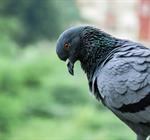
26 May 2025 | Apex Environmental Services (UK) Ltd
What Smell Do Birds Hate?
Birds are lovely, aren’t they? Graceful in flight, charming in song… until they start nesting in your gutters, covering your patio in droppings, or divebombing your head like it’s some sort of hobby. That’s when the romance wears off. So let’s cut to the chase: what smell do birds hate? Because if there’s a way to keep them away without reaching for spikes or nets straight off the bat, we’re listening.
Turns out, birds have surprisingly sensitive sniffers — or rather, sniffers that are highly selective. And some scents make them take off quicker than you can say “not in my garden.”
Birds Have a Keen Sense of Smell — Sort Of
Contrary to popular belief, birds can smell. Not all of them equally, though. Pigeons, starlings, and seagulls (you know, the usual suspects) do rely on scent more than you’d expect. It’s not as developed as in dogs, but it’s enough to help them find food, avoid predators, and yes — steer clear of nasty smells.
So, if you’re trying to keep birds off your balcony or away from your roof, the right repellent scent can be a gentle first line of defence — especially when you're not quite ready to break out the full fortress of netting and spikes.
So, What Smells Do Birds Actually Hate?
1. Peppermint Oil
It smells fresh to us, sure — but to birds, it’s pungent. Overwhelming. Offensively minty.
Some species, especially pigeons and starlings, actively avoid areas that have been treated with peppermint oil. You can soak cotton balls in the oil and place them near ledges, windowsills, or wherever the birds are being a nuisance. Reapply often, especially if it rains — the smell doesn’t linger as long as we’d like.
2. Vinegar
Classic. Sharp. Unmistakable.
Birds aren’t fans of the strong, acidic punch that vinegar packs. White vinegar is your best bet — easy to find, cheap, and non-toxic. A light spray around areas where birds loiter can help break their bad habits. Bonus: it also cuts through any lingering smells they’ve left behind.
3. Garlic and Onion
It’s not just vampires that detest garlic. The sulphurous compounds in garlic and onion can also put birds off. This one’s a bit more contentious, though — some birds are more sensitive than others. But worth trying if you've already got it in your kitchen cupboard.
Crush a few cloves, mix with water, and spray the solution around entry points or favourite perching spots. It won’t win you any hospitality points with guests, but it might help you reclaim your patio.
4. Cayenne Pepper & Chilli

Spicy doesn’t even begin to cover it.
Birds avoid capsaicin — the compound that gives chilli its heat — like the plague. It irritates their eyes and beaks. You can sprinkle cayenne powder directly or mix it into a water-based spray with a dash of vinegar (double whammy). Just avoid spraying on plants, as it can affect them too.
And obviously… keep it away from pets. What’s a mild inconvenience to a pigeon can be misery for a dog.
5. Citronella and Citrus Scents
You’d think lemon would be neutral — or even pleasant. But no. The sharpness of citrus oils, particularly citronella, is one of those divisive smells birds just can’t stand. This is a great choice for people who want their outdoor space to smell nice to humans, while still giving off ‘not welcome here’ vibes to the local gull population.
Look for essential oils, or scatter lemon or orange peels (just be sure to tidy them up before they go mouldy).
But Let’s Be Honest: Smells Only Go So Far
Here’s the thing: smells are a deterrent — not a solution. If you’re dealing with a determined flock, they’ll likely adapt over time. They’re not stupid. They’ll realise that peppermint oil isn’t going to hurt them. They’ll wait for the vinegar to fade.
So if you’re serious about long-term prevention, it’s best to combine scent-based repellents with physical ones. And when that time comes, you’ll want to bird-proof your property effectively.
(Yes, we do mean netting, spikes, or professional-grade solutions — depending on your space and the level of infestation.)
Can You DIY Bird Repellent With Smells?
Absolutely. In fact, there are plenty of natural bird repellent you can DIY options that involve the very smells we’ve just listed. Just bear in mind:
- They need reapplying regularly (especially after rain or wind)
- They work better in small spaces (e.g. balconies, ledges, windowsills)
- Results can vary by species — what works for pigeons might not work on seagulls
But still, for a gentle first step or a maintenance trick to keep a bird-free zone… they’re worth trying.
Final Thoughts
There’s no single magic bullet when it comes to keeping birds away. Smells can help, sure — especially if you're consistent and patient — but they work best as part of a bigger plan. Think of them as your soft launch into bird control.
And if you’re looking to escalate things a bit (humanely, of course), don’t hesitate to bring in the professionals. Apex Bird Control is always here to help you protect your home or business — without resorting to scarecrows and dramatic rooftop battles.


